
A non-commissioned officer (NCO) is a military officer who has not earned a commission. Non-commissioned officers usually obtain their position of authority by promotion through the enlisted ranks. In contrast, commissioned officers usually enter direct from a military academy, and are often expected to have a university degree.
Military justice is the body of laws and procedures governing members of the armed forces. Many nation-states have separate and distinct bodies of law that govern the conduct of members of their armed forces. Some states use special judicial and other arrangements to enforce those laws, while others use civilian judicial systems. Legal issues unique to military justice include the preservation of good order and discipline, the legality of orders, and appropriate conduct for members of the military. Some states enable their military justice systems to deal with civil offenses committed by their armed forces in some circumstances.

The units of the British Army are commanded by the Chief of the General Staff. This is broadly similar to the structures of the Royal Navy and Royal Air Force, in that the four-star (general-equivalent) commanders-in-chief have been eliminated since 2011 and service chiefs are given direct command of their respective services are responsible as Top Level Budget (TLB) holders. Army Headquarters is located in Andover, Hampshire. There is a Commander Field Army and a personnel and UK operations command, Home Command.
The Uniform Code of Military Justice is the foundation of military law in the United States. It was established by the United States Congress in accordance with the authority given by the United States Constitution in Article I, Section 8, which provides that "The Congress shall have Power....To make Rules for the Government and Regulation of the land and naval forces".

A military discharge is given when a member of the armed forces is released from his or her obligation to serve. Each country's military has different types of discharge. They are generally based on whether the person completed their training and then fully and satisfactorily completed their term of service. Other types of discharge are based on factors such as the quality of the person's service, whether their service had to be ended prematurely due to humanitarian or medical reasons, whether the person had been found to have drug or alcohol dependency issues and whether they were complying with treatment and counseling, or whether the person had demerits or punishments for infractions or were convicted of any crimes. These factors affect whether they will be asked or allowed to re-enlist and whether they qualify for benefits after their discharge.

The South African Military Health Service is the branch of the South African National Defence Force responsible for medical facilities and the training and deployment of all medical personnel within the force. Though unusual, as most national militaries integrate their medical structures into their existing service branches, the SANDF regards this structure as being the most efficient method of providing care and support to the SANDF's personnel.
The Singapore Armed Forces Commando Formation is a commando formation of the Singapore Armed Forces (SAF). It is made up of only one battalion, the 1st Commando Battalion. A specialised offensive unit, it specializes in preemptive operations involving small groups of specially-trained soldiers in enemy territory. Designed to be executed quickly in anticipation of a reaction by the enemy, these operations are normally short-term and intensive, it can however be extended due to the availability of service support in hostile environments.
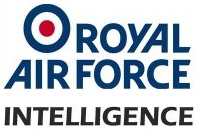
Intelligence services in the Royal Air Force are delivered by Officers of the Royal Air Force Intelligence Branch and Airmen from the Intelligence Analyst Trade and Intelligence Analyst (Voice) Trade. The specialisation has around 1200 personnel of all ranks posted to operational air stations, HQs and other establishments of the British Armed Forces, both in the United Kingdom and overseas.

The Army Medical Department of the U.S. Army (AMEDD), formerly the Army Medical Service (AMS), encompasses the Army's six medical Special Branches. It was established as the "Army Hospital" in July 1775 to coordinate the medical care required by the Continental Army during the Revolutionary War. The AMEDD is led by the Surgeon General of the U.S. Army, a lieutenant general.
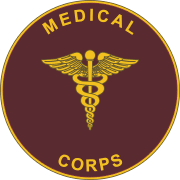
The Medical Corps (MC) of the U.S. Army is a staff corps of the U.S. Army Medical Department (AMEDD) consisting of commissioned medical officers – physicians with either an M.D. or a D.O. degree, at least one year of post-graduate clinical training, and a state medical license.
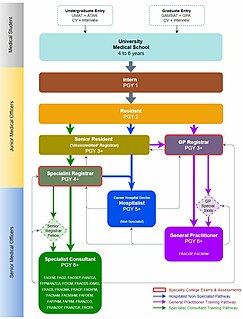
Medical education in Australia includes the educational activities involved in the initial and ongoing training of Medical Practitioners. In Australia, medical education begins in Medical School; upon graduation it is followed by a period of pre-vocational training including Internship and Residency; thereafter, enrolment into a specialist-vocational training program as a Registrar eventually leads to fellowship qualification and recognition as a fully qualified Specialist Medical Practitioner. Medical education in Australia is facilitated by Medical Schools and the Medical Specialty Colleges, and is regulated by the Australian Medical Council (AMC) and Australian Health Practitioners Regulatory Agency (AHPRA) of which includes the Medical Board of Australia where medical practitioners are registered nationally.
National Service (NS) is the national policy in Singapore mandated by statutory law that requires all male Singaporean citizens and second-generation permanent residents to serve a period of compulsory service in the uniformed services. It was first instituted in 1967 to help build Singapore's military forces soon after its independence, and has since been expanded to involve the police and civil defence force as well.

Tironut is the Hebrew term for the recruit training of the Israel Defense Forces (IDF).

Conscription exists in Israel for all Israeli citizens over the age of 18 who are Jewish, Druze, or Circassian; Arab citizens of Israel are not conscripted. Other exceptions are made on religious, physical, or psychological grounds. The normal length of compulsory service is currently two years and eight months for men, and two years for women.

Prisons in Ukraine are regulated by the State Penitentiary Service of Ukraine, a part of the Ministry of Justice of Ukraine.
68W is the Military Occupational Specialty (MOS) for the United States Army's Combat Medic. 68Ws are primarily responsible for providing emergency medical treatment at point of wounding on the battlefield, limited primary care, and health protection and evacuation from a point of injury or illness. This specialty is open to males and females with minimum line scores of 107 GT and 101 ST on the Armed Services Vocational Aptitude Battery.
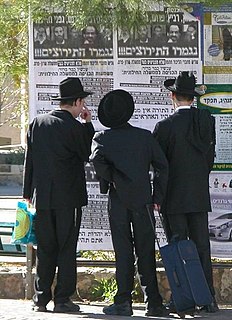
Exemption from military service in Israel is covered by the Israeli Security Service Law which states the grounds for exemption from serving in the Israel Defense Forces Exemptions are given based on the following criteria:
The medical profile is the system of numbers the Israel Defense Forces (IDF) uses to indicate the medical suitability of a person in order to serve in various positions in the IDF. The profiles range between 21 and 97. A profile of 64 and under makes it impossible to serve in direct combat roles.

Operational Training Units (OTU) and Replacement Training Units (RTU) were training organizations of the United States Army Air Forces during World War II. Unlike the schools of the Army Air Forces Training Command (AAFTC), OTU-RTU units were operational units of the four domestic numbered air forces along with I Troop Carrier Command and Air Transport Command, with the mission of final phase training new pilots or crews. Most were disbanded in the Spring of 1944 and replaced by combat crew replacement centers assigned to base units.
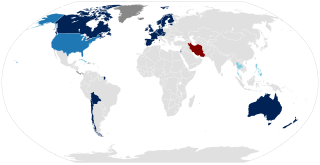
Not all armed forces have policies explicitly permitting LGBT personnel. Generally speaking, Western European militaries show a greater tendency toward inclusion of LGBT individuals. As of 12 April 2019, 19 countries allow transgender military personnel to serve openly: Australia, Austria, Belgium, Bolivia, Canada, the Czech Republic, Denmark, Estonia, Finland, France, Germany, Ireland, Israel, Netherlands, New Zealand, Norway, Spain, Sweden, and the United Kingdom. Cuba and Thailand reportedly allowed transgender service in a limited capacity. In 1974, the Netherlands was the first country to allow transgender military personnel.